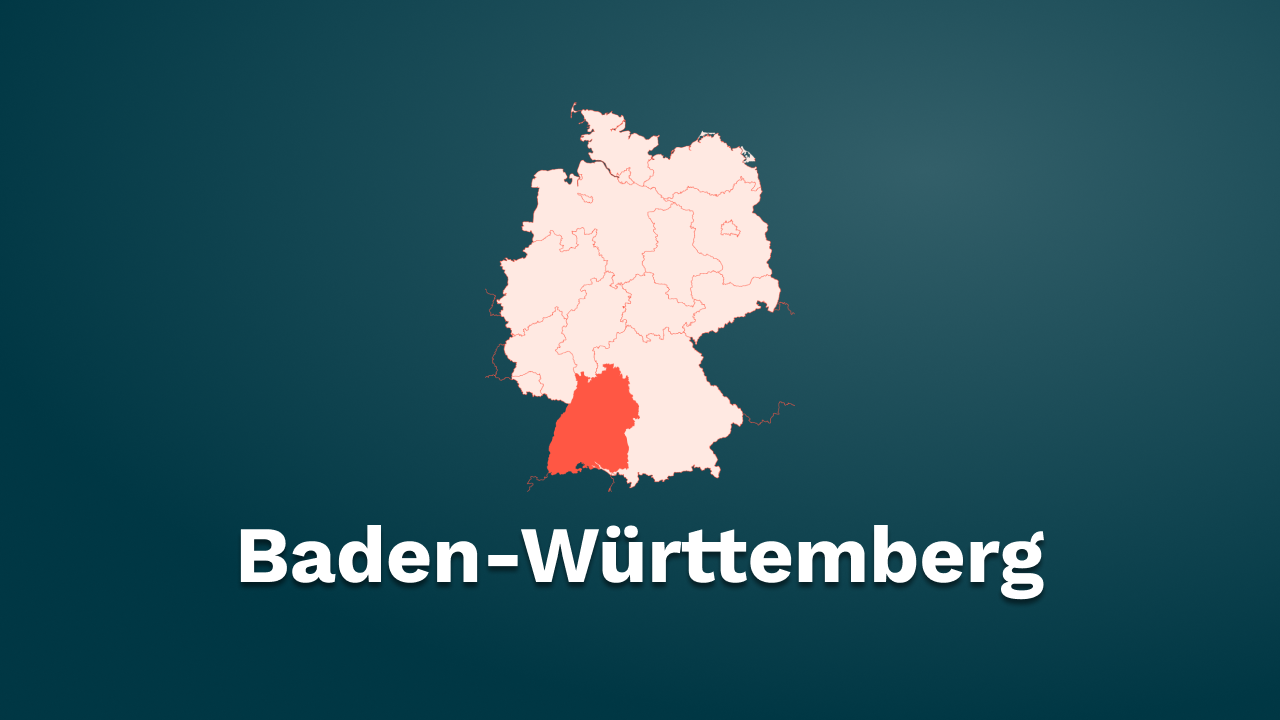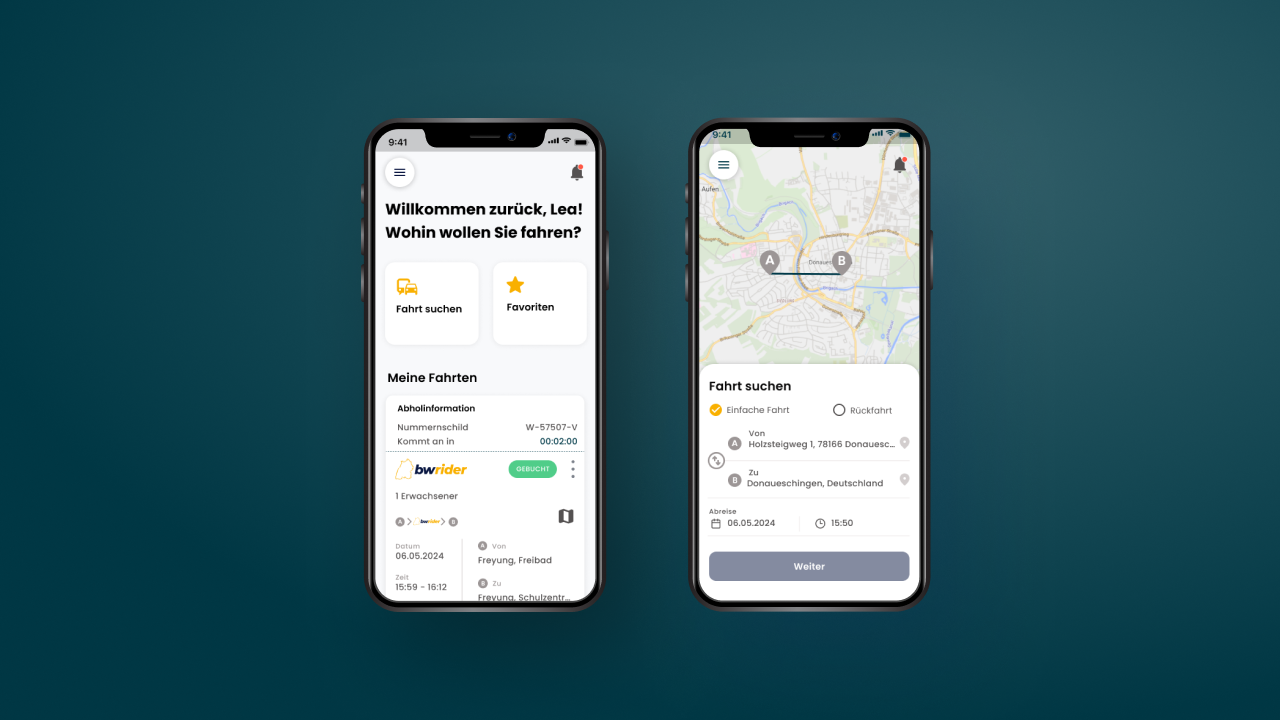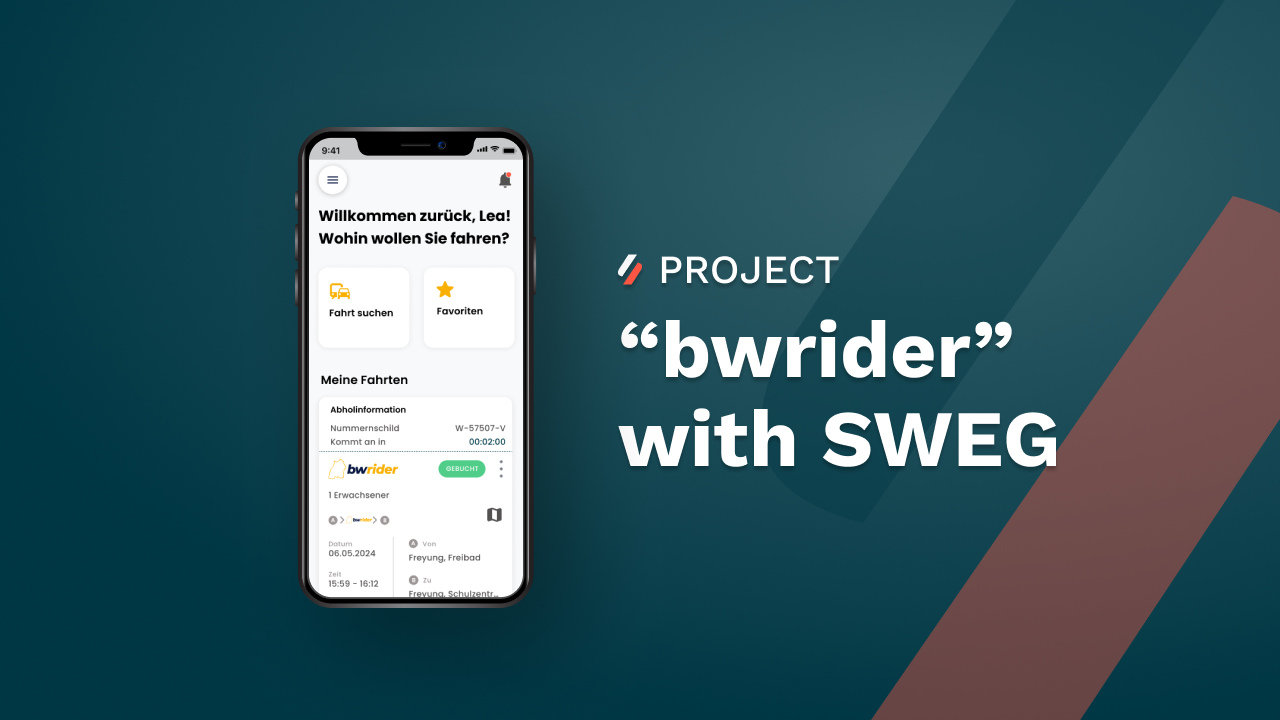The Southwest German Transport Company (“SWEG”) has launched a new digital on-demand transportation platform in Baden-Württemberg, using Simdle Mobility’s software solution. With the "bwrider" passenger app, various forms of on-demand services can be offered and used more easily. The platform aims to advance the digitalization of the transport sector and provide extended mobility options for residents of Baden-Württemberg.
The vision: a central passenger app for all On-Demand services in Baden Württemberg
The project’s goal is to create a central passenger app that integrates a wide range of demand-responsive transport services in Baden-Württemberg and serves as a key component of the state’s „bwegt“ mobility app. The supported transport types include demand-responsive line services, community buses, public transport taxis, and call buses, giving users access to better and more efficient mobility solutions.

Improved accessibility of public transport in Baden-Württemberg
The project originated from an analysis of the current public transport situation in Baden-Württemberg.
The state of Baden-Württemberg has 11 million inhabitants of which the majority is living in rural areas. While 85% of residents can reach a public transport stop within less than five minutes, public transport service frequency often falls short. On-demand transport is a solution to fill these gaps.
On the one hand, numerous on-demand mobility offerings are already in place in the region to enhance service. However, these come from different providers and are often still in pilot stages, leading to a large number of different, non-integrated apps. Furthermore, planning and setup costs are often high. On the other hand, transport options like call buses and call taxis (demand-responsive line services) are typically not digitalized.
These insights highlighted the need for a comprehensive solution to bring together all on-demand services (both existing and new) in the county, creating a seamless and accessible public transport system, especially in rural areas.
Simdle Mobility’s contribution
Through Simdle Mobility, Losch Digital Lab brings its extensive expertise to developing the user-friendly passenger app and the flexible, highly configurable backend system.
Multi-tenancy
Given that this project encompasses services across different regions, it also includes various clients with unique geographic constraints and needs. Simdle Mobility assists SWEG in chosing the most appropriate service case by case.
Our platform enables the use of local white-label apps, integration into existing mobility apps, and the creation of new on-demand transport services.
It includes both the backend system for the different tenants and the driver app for transport operators. At Simdle we continually strive to balance passenger comfort and operational efficiency for each operator and tenant.
Integration of flexible bus lines
Since different tenants have varying requirements, Simdle Mobility adopts an agile approach in this project, developing new features and improving existing ones.
A key feature of this project is the integration of "flexible bus lines." It allows call buses and call taxis to be incorporated alongside specific existing timetables. This brings us closer to our goal of fully digitalizing all forms of demand-responsive transport.
This unique feature distinguishes the project from other on-demand mobility services, which group and pool trips within a designated area. With Simdle, timetable-based bookings for call buses can also be included in Simdle’s software.
In an upcoming blog post, you’ll learn more about our new bus line feature.

Contribution to the public transport strategy 2030
The integration of both existing and new demand-responsive transport services represents a significant digitalization of the mobility infrastructure and helps connect rural areas to public transport as part of Baden-Württemberg’s “Public Transport Strategy 2030".
We are proud to contribute to the success of this project with our Simdle Mobility software solution and to play a vital role in the development of mobility in Germany.
Following a successful trial phase since March 2024, regular operation has now been launched with two clients: In Zollern Alb, the project went live in late September, and in Bad Waldsee, it launched in early November. So far, four clients are participating in six service areas, working with 13 transport companies.

The companies behind this project
Based in Lahr/Schwarzwald, SWEG operates bus services in urban and rural areas as well as rail freight and local passenger rail transport in Baden-Württemberg and neighboring regions.
Trapico GmbH, a subsidiary of SWEG GmbH, specializes in planning and implementing innovative mobility and transport concepts, supporting both private and public stakeholders in mobility matters. For this project, Trapico is open to working with additional partners, especially municipalities and transport associations in Baden Württemberg to further expand the system. Interested parties can contact Waldemar Romanow (waldemar.romanow@sweg.de), the system manager for the on-demand platform.
The project is co-financed by the Federal Ministry for Digital and Transport and the Baden-Württemberg Public Transport Authority (NVBW).
If you would like to learn more about this fantastic project or discuss your own project, feel free to contact us!